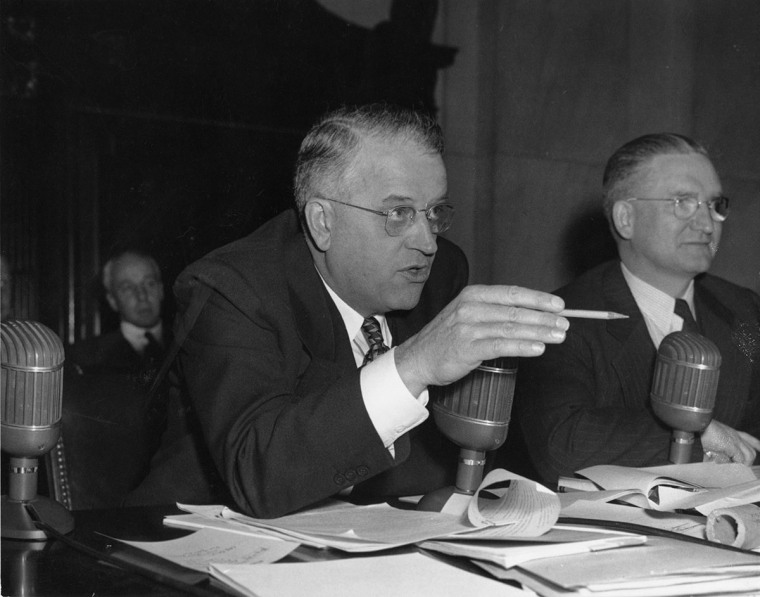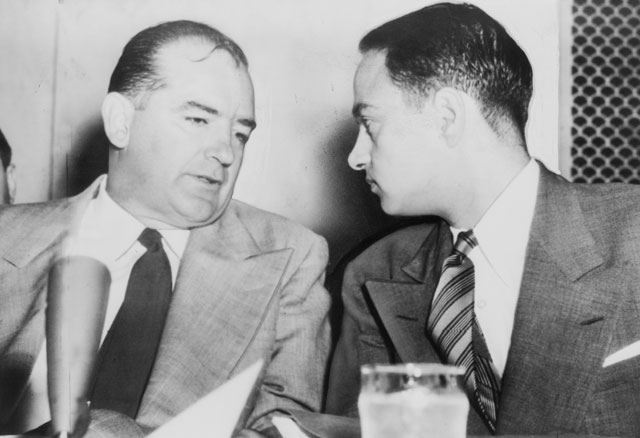“Lavender Scare” Bill Looks To Address The Witch Hunt of the Government's Purge on Gays in Government

By Julie Moreau
Democratic lawmakers are trying to make amends for a dark period in U.S. history — when thousands of federal employees were fired or forced to resign between the late 1940s and 1960s because they were thought to be gay.
The reintroduced Lavender Offense Victim Exoneration Act, or LOVE Act, aims to redress the harms done during the so-called Lavender Scare. At least 1,000 people were purged from the State Department alone.

“It is long past time for the U.S. government to recognize the stories of the LGBTI members of the State Department who were treated unfairly during the ‘Lavender Scare,’ and to offer them and their families a measure of justice,” stated Sen. Bob Menendez, D-N.J., one of the bill’s sponsors and the ranking member of the Senate Foreign Relationships Committee.
If passed, the legislation would have the State Department “review all employee terminations that occurred after January 1, 1950, to determine who was wrongfully terminated owing to their sexual orientation, whether real or perceived.” The bill contains several provisions to address the wrongful termination of employees perceived to be gay. It calls on Congress to issue a formal apology to these employees, and it establishes a reconciliation board that would contact them or their families and corrects their employment records to reflect the board’s findings if desired.
The legislation also creates a permanent museum exhibit about the Lavender Scare in the U.S. Diplomacy Center and sets up an advancement board to review difficulties facing current LGBTQ diplomats and their families. Finally, it mandates a review of countries that currently refuse to issue visas to the same-sex spouses of Foreign Service personnel.
The LOVE Act was first introduced in 2017, shortly after then-Secretary of State John Kerry formally apologized for the State Department’s institutional discrimination in the past against gay and lesbian federal workers. The bill has more co-sponsors this time around — 19 Democratic senators, several of whom are running for president, including Kirsten Gillibrand of New York, Kamala Harris of California, Amy Klobuchar of Minnesota, and Cory Booker of New Jersey. Michael Guest, the former U.S. ambassador to Romania under President George W. Bush, called the legislation “overdue.”
“The country has come such a long way in understanding sexuality,” Guest told NBC News. “It's appropriate that there be some sort of effort made for the families of those involved.”
Guest, who was the first openly gay ambassador to be confirmed by the U.S. Senate, said that even when he entered the State Department in the 1980s, fears lingered that something like the Lavender Scare could return and that many still believed that being known as gay or lesbian could “hurt their careers.”
Guest said he is pleased that Senate Democrats have reintroduced the legislation but “disappointed” that no Republicans had signed onto the bill. Because of this, he said, it has a “very slim chance of moving.” However, he added, he is “hopeful there will be similar legislation on the House side” in order to broaden the conversation about this portion of American history.
A ‘SHAMEFUL’ HISTORY
 |
| The guy on the right was Trump's Lawyer and Trump says He was This Lawyer's Protege (Roy Cohn, gay himself), The one on the left Congressman (McCarthy) who went after gays in every profession |
The bill recognizes the “shameful” history of what has come to be called the Lavender Scare, a name that comes from the color lavender’s association with homosexuality. The term “lavender lads,” for example, was used by politicians at the time to refer to gay men in the State Department, according to David K. Johnson, a history professor at the University of South Florida and author of “The Lavender Scare: The Cold War Persecution of Gays.”
The so-called Lavender Scare, Johnson explained, was “a fear that permeated political culture that gay people had infiltrated the national government, and they posed a threat to national security and needed to be removed from public service.”
“It involved a whole government apparatus to implement,” he added, which amounted to a government-sanctioned “systematic campaign to remove every suspected gay and lesbian from the federal government.”
The persecution of gays and lesbians was part of Joseph McCarthy’s attempts to identify and expunge those with suspected Communist affiliations from the U.S. government. In 1953, then-President Dwight Eisenhower signed an executive order that included “sexual perversion” as grounds for dismissal. The order was enforced until 1965, when Bruce Scott, a gay man fired from the federal government because of his sexual orientation, won a lawsuit that forced the civil service to change its policy, Johnson explained. While it is estimated that approximately 1,000 gay men and lesbians, like Scott, were fired from the State Department because of their sexuality in the ‘50s and ‘60s, Johnson estimated that anywhere from 5,000 to 10,000 people were fired throughout the U.S. government during that time.
Johnson also said an unknown number of people who were under investigation by the State Department committed suicide. He said the State Department was well aware of the harm done by the investigations into employees’ sexuality. In his book, Johnson highlights the case of Andrew Ference, an administrative assistant at the U.S. embassy in Paris, who killed himself after two days of interrogations into his sexuality. The State Department, Johnson said, covered up the cause of his death and lied to his family.
'SECURITY RISKS'
While the Lavender Scare ostensibly ended by the 1970s, the LOVE Act states that government employees were being purged by the State Department as late as the 1990s because they posed “security risks.”
As a result of this, Guest said, the government was deprived of expertise, and the Foreign Service became further entrenched in white male conservatism.
Under the Trump administration, the State Department has reversed course on many LGBTQ issues.
In October of last year, for example, the department ended a policy implemented by former Secretary of State Hillary Clinton that allowed unmarried same-sex partners of staff from U.S.-based international organizations — such as the United Nations, the World Bank, and the International Monetary Fund — to obtain a spousal visa.
And just this week, the State Department announced it would appeal a California court’s ruling to grant U.S. citizenship to a married same-sex couple's child conceived via surrogate.
“Our nation is at its best when we live up to our values and highest aspirations,” Menendez shared in a statement about the reintroduction of the LOVE Act. “With this legislation, Secretary [Mike] Pompeo and every Member of the Trump administration can make certain that our LGBTI diplomats and development professionals are fully respected as full members of the State Department family.”
When asked for comment on the LOVE Act, a State Department spokesperson told NBC News, “We decline to comment on pending legislation.”
Comments